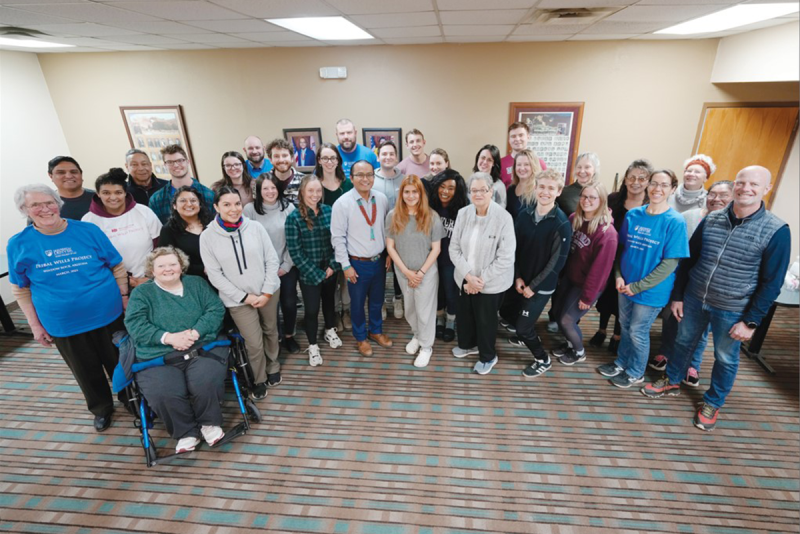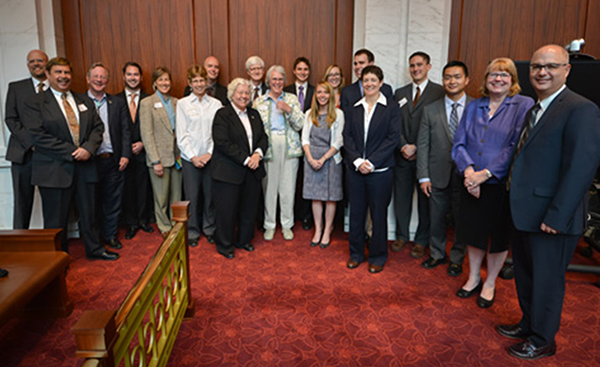A Decade of Service: Tribal Wills Project Turns Ten

Navajo Nation President Buu Nygren (c) met with Professor Lucy Marsh (l) and volunteer students and attorneys in Window Rock, Arizona, in March 2023.
Since March 2013, University of Denver Sturm College of Law students and supervising attorneys have volunteered their time and effort to address an unmet need by traveling to tribal communities in the southwest and drafting wills for Native American tribal members, ensuring their trust lands are passed along according to their wishes.
The origin of this need was created by Congress in 2008: under the American Indian Probate Reform Act (AIPRA), trust lands held by Native American tribal members who died without a will would be passed entirely to the oldest living child rather than to all surviving heirs. The goal of the legislation was to stop fractionation of trust lands into miniscule parts, but the unintended consequences of the law created significant problems for Native American families. As Lucy Marsh, a professor of Estates and Trusts at Denver Law and the founder of the project explains it, “Nothing to the surviving spouse, nothing to the other kids…you can imagine that causes a lot of conflict in the family.”
Although the presence of a will to govern the distribution of trust land and other property would solve the problem, a cultural barrier existed among many Native American communities that made even talking about death a taboo. An even more intractable problem was a shortage of attorneys available to tribal members, and attorneys in general who were familiar with laws governing tribal lands. Trying to find a solution, in November 2012, John Roach, then a Fiduciary Trust Officer for the Department of the Interior, reached out to law schools throughout the southwest with a question: would student attorneys be interested in volunteering to write wills for tribal members?
Only one school responded to that plea. In February 2013, Professor Marsh convened a brainstorming session that included Roach, former Colorado Supreme Court Justice Gregory Hobbs, who passed away in 2021, Ernest House Jr., who was at that time Executive Secretary of the Colorado Commission of Indian Affairs, Sturm College of Law Professor Lindsay Webb, and Sheena Goldsborough, JD’14, then a 2L at Denver Law. That session also included the late Professor Fred Cheever, then an associate dean of the law school. As a result of that meeting, and with the support of local attorneys and Cheever’s approval for the initiative, John Roach’s question was answered with the creation of the Tribal Wills Project. The following month, an inaugural group of volunteer students and attorneys set out on their first adventure, to the Southern Ute and Ute Mountain Ute Tribes in Colorado.
Over the past ten years, under Professor Marsh’s guidance, the Tribal Wills Project has expanded beyond Colorado, traveling to New Mexico, Utah, Arizona, California, Montana and South Dakota, on three trips a year (aside from an interruption due to closures and travel restrictions during the COVID-19 pandemic). Each year, the trips take place in January (over winter break), March (over spring break), and May (the week following graduation). The number of clients served each trip varies, but this year, the total served between January and May was just over 200. “Not bad for about three weeks of work,” said Marsh.
Through ten years and 22 trips, far more than three weeks of work have gone into an effort that has produced hundreds of wills to help thousands of individual tribal members. Marsh notes that although students receive no payment, and no academic credit for the experience, it frequently becomes one of their favorite and most fulfilling experiences in law school. In fact, no one is paid for their efforts on the project, including the volunteer supervising attorneys who have contributed hundreds of billable hours over the years. Those attorneys have always included Marsh herself and sometimes other DU law professors such as K.K. DuVivier and Tom Russell. Even so, all expenses on the trip are paid for so that no student who wishes to participate is prevented from doing so due to financial barriers.
With the generous support of individual donors, Marsh hopes that the Tribal Wills Project will continue well into the future. Visit the Tribal Wills Project to learn more about the experience, the clients it has served, the accolades it has received, or to become a part of its success by providing a donation.



